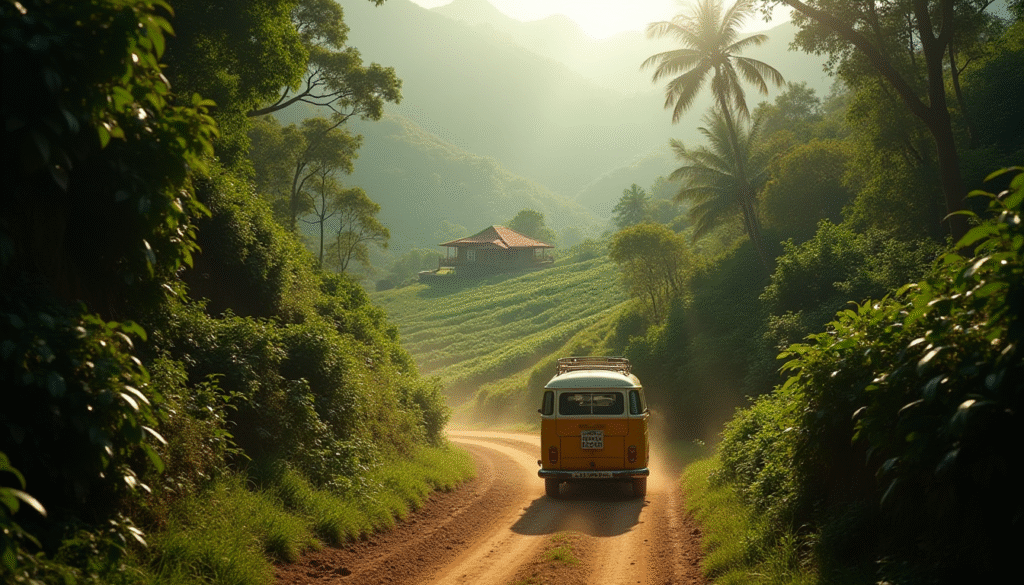We are, by nature, creatures of the map. We chart our courses with an implicit faith in the straightest line. The itinerary is our scripture, the GPS our oracle. A missed exit? A personal failure.
For a long time, I was a high priestess of this creed. But travel has a way of humbling you, of tearing up your carefully drawn maps. It taught me a more profound lesson, one I am still learning: the detour is not the obstacle; it is very often the path itself.
The Itinerary Was Perfect. Until It Wasn’t.
The lesson hit me on a FAM trip (“Familiarization” in travel industry speak) in Jamaica. Our group was cocooned in a comfortable van, speeding from the coast of Ocho Rios toward Kingston. The plan was clear: stop at the iconic Dunn’s River Falls. Check the box. Take the photo. On to the next.
Our guide, Desmond—a man with a laugh from the soul and eyes that missed nothing—had other ideas.
The Spontaneous Turn That Changed Everything
Without a word of warning, Desmond wrenched the wheel. Our van left the smooth highway and began a steep, serpentine climb up a narrow, unmarked road into the emerald folds of the Blue Mountains.
My inner planner screamed: Was this on the itinerary? Would this make us late? Were we even supposed to be here?
But as we climbed, the world transformed. The humid, coastal air thinned and cooled. And then, just as my anxiety peaked, the road opened onto a secret world.
A Hidden World at the Top of the Mountain
We found ourselves on a breathtaking farmland plateau. The air was crisp and carried a single, intoxicating scent: the rich, physical presence of roasting coffee.
A local family welcomed our unannounced arrival with wide smiles and melodic patois. They ushered us into their home, a space filled with the smell of warm humanity and coffee beans.
The Cup of Coffee That Was a Revelation
They handed us steaming mugs of their brew. This wasn’t just coffee. It was a story in a cup. It tasted of:
- Volcanic earth and cool mountain air
- The sun and rain that nurtured the plants
- Their own immense pride and warmth
It was here I learned the true meaning of “Jamaica Blue Mountain” coffee. This was the source. I bought a small bag from their ramshackle store—to this day, the best coffee I’ve ever tasted, not for its flavor, but for its story.
The “Aha!” Moment That Buried the Anxiety
It was a classic “thought avalanche.” The petty worry about our schedule was completely buried under a landslide of insight. Desmond’s detour—his trust in local knowledge over a foreign itinerary—had given us the most authentic experience of the entire trip.
We had been so focused on the destination, we were blind to the richer beauty of the path we were never meant to walk.
Where Else Does This Lesson Echo?
This isn’t just about travel. Once you see it, you see it everywhere. The detour is life’s ultimate teacher.
- The Career Detour: The lawyer laid off who discovers a passion for teaching and finds a fulfillment she never knew in the courtroom.
- The Project Detour: The meticulously planned project that fails, revealing a fundamental flaw and opening the door to a better, more innovative idea.
- The Relationship Detour: The painful breakup that forces a necessary path of self-discovery, leading you to become capable of a healthier love.
Your Map is Just a Suggestion
We are cartographers of our own lives, drawing our maps with painstaking precision. We want the highway, direct and fast.
But the most significant growth—the kind that forges character and resilience—rarely happens on the straight, well-trodden road. It happens in the breakdown lane, on the dirt path, in the moments of being utterly lost.
That’s where you discover resources you didn’t know you had.
How to Start Embracing Your Own Detours
The goal isn’t to become a perfect planner who avoids deviations. The goal is to cultivate a new kind of navigation.
Start seeing the interrupted flight, the closed road, the failed project not as frustrations, but as invitations.
They are life’s way of wresting the pen from your hands and whispering: “Let me show you something you didn’t know you were looking for.”
So, the next time you see an unmarked turn, take a deep breath. Put away the map. Silence the GPS.
And joyfully, take the scenic route.



